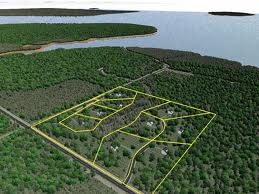Conservation easements are restrictions on a property's title deed that are supposed to permanently prohibit named developments. Such developments might be mining or forestry or housing subdivisions. In the US these easements are donated to a land trust or government agency that certifies its environmental value and is responsible for monitoring its compliance. The loss of value to the original land caused by the easement is then tax-deductible.
 Whilst easements have helped protect valuable ecosystems they are increasingly little more than tax deduction schemes. Often landowners have no intention of undertaking that sort of development anyway. The landowner claims a tax deduction for lost value, which is usually estimated by the landowners themselves. For example, a golf course might have an easement on it that no housing or shopping development will take place there.
Whilst easements have helped protect valuable ecosystems they are increasingly little more than tax deduction schemes. Often landowners have no intention of undertaking that sort of development anyway. The landowner claims a tax deduction for lost value, which is usually estimated by the landowners themselves. For example, a golf course might have an easement on it that no housing or shopping development will take place there.
Naturally that value is often an overestimate, especially since such easements can add value to a property rather than reduce it. Many land trusts don’t have the resources or the inclination to monitor and police the terms of the easement and once the land has been sold onto new landowners, the likelihood that the conditions of the easement will be breached without penalty increases. In this way private landowners subsidise their land purchases with taxpayer money and little is really gained in terms of conservation.
 Alternatively an environmental charity, such as The Nature Conservancy (TNC), might buy the land, put an easement on it that still enables a home to be built on it and sell it at a discount. In return the new owners make a donation to the charity of a similar amount to the discount and claim the donation as a tax deduction.
Alternatively an environmental charity, such as The Nature Conservancy (TNC), might buy the land, put an easement on it that still enables a home to be built on it and sell it at a discount. In return the new owners make a donation to the charity of a similar amount to the discount and claim the donation as a tax deduction.
Over time easements have become what John Echeverria, a former general counsel of the National Audubon Society, calls "a gross fraud on the U.S. taxpayer". They are used by large corporations and wea lthy individuals to reduce their tax bill. Many easements are designed by property owners so they don't interfere with their future plans for the property anyway and often they actually increase the value of a property rather than reducing it, particularly if it is used for luxury houses.
 In terms of the bigger picture, this method of environmental protection where a patchwork of land parcels are protected with no selection criteria apart from owners' desires for tax breaks, is not particularly beneficial to long term environmental goals. This is particularly the case when the land would not have been developed in the way that is prohibited anyway.
In terms of the bigger picture, this method of environmental protection where a patchwork of land parcels are protected with no selection criteria apart from owners' desires for tax breaks, is not particularly beneficial to long term environmental goals. This is particularly the case when the land would not have been developed in the way that is prohibited anyway.
Often the land trusts are small and adhoc and not publicly accountable. There are also problems with enforcement of easements: "Surveys of land trusts around the nation, often conducted by the land trusts themselves, show that hundreds -- perhaps thousands -- of easements have been violated or altered at the request of landowners."
Often the protected land still allows many types of environmentally damaging activities, including clearing, grazing, fencing and hunting. What is more the land protected is private property and not accessible to the public.
An example is an agreement with forestry corporation Georgia-Pacific to jointly manage 21,000 acres of hardwood forest in North Carolina. In return for a Georgia Pacific’s promise to conserve 6,000 acres of land along a river, The Nature Conservancy (TNC) helps manage its timberlands in the area.
However the easements that protect a portion of the land may be stopping development of the land but not protecting their wilderness values. Jym St. Pierre, director of Restore in Maine, argues that “These aren’t ‘forever wild’ easements… Some people call them ‘forever logging’ easements” because the timber companies are replacing native forests with plantation style forests that feature monocultures and therefore biodiversity is not being protected.
TNC likes easements because they are cheaper than buying the land outright, the land does not have to be managed by TNC staff, it can continue “to contribute as an economic enterprise” and the “private owner (rather than the state agency) takes on the responsibility for maintaining improvements.”
In 2003 a Senate Finance Committee
revealed the Conservancy had repeatedly bought scenic properties, added development restrictions, then resold the land at reduced prices to Conservancy trustees and supporters. The buyers, some of whom retained the right to build houses on the land, in turn gave the Conservancy cash donations that supplied them with hefty tax writeoffs.
The Conservancy board banned such sales to insiders although it maintained its reliance on conservation easements.